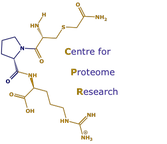Contact
What is the best route to contact?
14/05/15 09:39 Filed in: Contact
In the first instance, drop a quick email to Rob, Claire or Philip. r.beynon@, ceyers@ or philipjb@ liv.ac.uk. We’ll arrange for a preliminary meeting in which we discuss your project and advise on optimal routes to deliver the results you wish. In many projects, the bioinformatics analysis is a critical part of this discussion, and we will clarify the point at which we stop, and advise you how to engage with bioinformaticians here at Liverpool..
Proteomics as a service
How can I have proteomics samples run?
We are always willing to talk to colleagues about the potential for running new analyses. These can vary from simple 'quick look' analyses to complete and complex, fully biologically replicated analyses. In all circumstances, we adopt a model of 'defend the mass spectrometer form the sample'! In fact, mass spectrometers are remarkably robust; it is the delivery of peptides through a nanoflow high pressure chromatography system that causes the problems.
Biological samples can be delivered in exotic and complex matrixes, either reflecting the biological context of the sample or the sample work up chemistry imposed by the user m(detergent, PEG and glycerol might seem like a dream extraction buffer to you, but we are never going to run that sample for you!). We are very reluctant to receive samples that contain insoluble material, high concentrations of detergents, polymers such a polyethylene glycol (PEG), for example. A nanoflow high resolution column (75um diameter and 150mm long) costs, with trap, nearly £1,000 and is time consuming to exchange and optimise. You can see why we're reluctant to take anonymous samples!
It is far, far better if you come to talk to us before you attempt to prepare proteomics samples.
We are always willing to talk to colleagues about the potential for running new analyses. These can vary from simple 'quick look' analyses to complete and complex, fully biologically replicated analyses. In all circumstances, we adopt a model of 'defend the mass spectrometer form the sample'! In fact, mass spectrometers are remarkably robust; it is the delivery of peptides through a nanoflow high pressure chromatography system that causes the problems.
Biological samples can be delivered in exotic and complex matrixes, either reflecting the biological context of the sample or the sample work up chemistry imposed by the user m(detergent, PEG and glycerol might seem like a dream extraction buffer to you, but we are never going to run that sample for you!). We are very reluctant to receive samples that contain insoluble material, high concentrations of detergents, polymers such a polyethylene glycol (PEG), for example. A nanoflow high resolution column (75um diameter and 150mm long) costs, with trap, nearly £1,000 and is time consuming to exchange and optimise. You can see why we're reluctant to take anonymous samples!
It is far, far better if you come to talk to us before you attempt to prepare proteomics samples.
